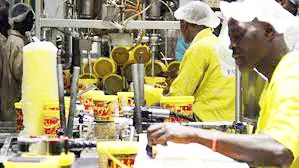In the intricate dance of monetary policy decisions, the recent moves by the Central Bank of Nigeria’s (CBN) Monetary Policy Committee (MPC) have cast a shadow over the manufacturing sector, leaving business owners and boards grappling with uncertainty.
With a notable hike in interest rates, adjustments in the asymmetric corridor around the Monetary Policy Rate (MPR), and changes in the Cash Reserve Ratio (CRR), the challenges ahead seem daunting.
Yet, amidst the complexities of economic policy, anecdotes offer a glimpse into the real-world consequences of these decisions, shedding light on the path forward.
As Kingsley Moghalu, a former CBN deputy governor, aptly remarked, “It will hit businesses hard, but inflation is hitting harder.” This sentiment encapsulates the delicate balancing act facing policymakers and business leaders alike.
The urgency to slay the inflation dragon looms large, threatening to engulf the economy in a downward spiral reminiscent of Zimbabwe or Venezuela. In this context, the imperative to reduce the money supply and prioritise price stability takes precedence, even at the expense of short-term economic growth.
Economists often refer to this dilemma as the monetary policy trilemma, wherein policymakers are confronted with the challenge of simultaneously achieving three objectives: monetary autonomy, exchange rate stability, and capital mobility.
However, the recent MPC decisions underscore the inherent trade-offs embedded within this trilemma, forcing policymakers to make difficult choices that inevitably impact businesses and industries across the economy.
Consider the plight of a small-scale manufacturer, operating on the outskirts of Lagos. With aspirations of growth and expansion, the company relies heavily on bank financing to fuel its operations.
Yet, the sudden hike in interest rates sends shockwaves through its financial projections, threatening to derail its plans. As borrowing costs soar, the company grapples with the dilemma of whether to scale back its ambitions or seek alternative sources of funding.
Meanwhile, a seasoned industrialist in Kano shares a different perspective. Having weathered numerous economic storms over the years, he recognises the cyclical nature of inflationary pressures and the need for decisive action.
Reflecting on past experiences, he recalls how unchecked inflation eroded the purchasing power of consumers, leading to stagnant demand for manufactured goods. In his view, while the MPC’s decisions may pose short-term challenges, they are a necessary step towards restoring macroeconomic stability and laying the groundwork for sustainable growth.
These anecdotes underscore the human dimension of monetary policy decisions, highlighting the profound impact they have on livelihoods and communities. For businesses in the manufacturing sector, the path forward lies in adaptation and resilience. While the headwinds may be strong, there are opportunities to innovate, diversify, and thrive amidst uncertainty.
One avenue for resilience lies in technological innovation. Across the country, forward-thinking manufacturers are embracing automation, digitisation, and advanced manufacturing techniques to enhance productivity and competitiveness. By leveraging technology, these firms can mitigate the impact of rising production costs and navigate the challenges posed by tightening credit conditions.
Furthermore, strategic partnerships offer a pathway to resilience for manufacturers facing constraints on access to credit. By forging alliances with suppliers, distributors, and financial institutions, businesses can pool resources, share risks, and unlock new avenues for growth. Collaborative efforts between the public and private sectors can also play a pivotal role in supporting the manufacturing industry through targeted incentives, infrastructure investments, and policy reforms.
Yet, amidst the clamor for growth and expansion, it is essential not to lose sight of the broader macroeconomic context. As Moghalu rightly emphasises, the specter of inflation must be addressed head-on to safeguard the economy from instability and volatility. While the MPC’s decisions may entail short-term sacrifices, they are a necessary step towards achieving long-term prosperity and sustainability.
In navigating the complex terrain of monetary policy, policymakers must remain mindful of the trade-offs inherent in the monetary policy trilemma. By striking a delicate balance between inflation containment, economic growth, and financial stability, they can chart a course that fosters inclusive development and prosperity for all.
Ultimately, the story of Nigeria’s manufacturing sector is one of resilience, innovation, and adaptation.
Despite the challenges posed by the recent MPC decisions, there is reason for optimism. By drawing upon lessons from the past, harnessing the power of technology, and fostering collaboration, businesses can weather the storm and emerge stronger on the other side. In doing so, they not only safeguard their own interests but also contribute to the collective prosperity of the nation as a whole.





